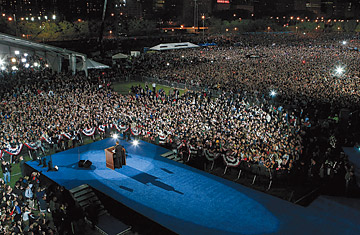
The scene in Chicago during the exuberance of election night 2008.
(3 of 5)
Flash forward to the evening of Nov. 4, and you can see why liberalism has sprung back to life. Ideologically, the crowds who assembled to hear Obama on election night were linear descendants of those egg throwers four decades before. They too believe in racial equality, gay rights, feminism, civil liberties and people's right to follow their own star. But 40 years later, those ideas no longer seems disorderly. Crime is down and riots nonexistent; feminism is so mainstream that even Sarah Palin embraces the term; Chicago mayor Richard Daley, son of the man who told police to bash heads, marches in gay-rights parades. Culturally, liberalism isn't that scary anymore. Younger Americans--who voted overwhelmingly for Obama--largely embrace the legacy of the '60s, and yet they constitute one of the most obedient, least rebellious generations in memory. The culture war is ending because cultural freedom and cultural order--the two forces that faced off in Chicago in 1968--have turned out to be reconcilable after all.
The disorder that panics Americans now is not cultural but economic. If liberalism collapsed in the 1960s because its bid for cultural freedom became associated with cultural disorder, conservatism has collapsed today because its bid for economic freedom has become associated with economic disorder. When Reagan took power in 1981, he vowed to restore the economic liberty that a half-century of F.D.R.-style government intrusion had stifled. American capitalism had become so thoroughly domesticated, he argued, that it lost its capacity for dynamic growth. For a time, a majority of Americans agreed. Taxes and regulations were cut and cut again, and for the most part, the economic pie grew. In the 1980s and '90s, the garden of American capitalism became a pretty energetic place. But it became a scarier place too. In the newly deregulated American economy, fewer people had job security or fixed-benefit pensions or reliable health care. Some got rich, but a lot went bankrupt, mostly because of health-care costs. As Yale University political scientist Jacob Hacker has noted, Americans today experience far-more-violent swings in household income than did their parents a generation ago.
Starting in the 1990s, average Americans began deciding that the conservative economic agenda was a bit like the liberal cultural agenda of the 1960s: less liberating than frightening. When the Gingrich Republicans tried to slash Medicare, the public turned on them en masse. A decade later, when George W. Bush tried to partially privatize Social Security, Americans rebelled once again. In 2005 a Pew Research Center survey identified a new group of voters that it called "pro-government conservatives." They were culturally conservative and hawkish on foreign policy, and they overwhelmingly supported Bush in 2004. But by large majorities, they endorsed government regulation and government spending. They didn't want to unleash the free market; they wanted to rein it in.
Those voters were a time bomb in the Republican coalition, which detonated on Nov. 4. John McCain's promises to cut taxes, cut spending and get government out of the way left them cold. Among the almost half of voters who said they were "very worried" that the economic crisis would hurt their family, Obama beat McCain by 26 points.
